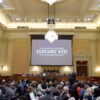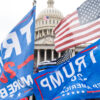The final presidential debate, on foreign policy, is scheduled for Monday, October 22. Moderator Bob Schieffer announced that the topics will be: “America’s Role in the World,” “Our Longest War—Afghanistan and Pakistan,” “Red Lines—Israel and Iran,” “The Changing Middle East and the New Face of Terrorism,” and “The Rise of China and Tomorrow’s World.” Heritage’s foreign policy experts have written a series of tip sheets for prepping on each of these issues. You can watch the live stream of the debate with us on Monday here.
The Issue: “Our Longest War—Afghanistan and Pakistan”
The Positions: President Obama has focused most of his public remarks on the war in Afghanistan on timelines for withdrawal rather than explaining how the U.S. will ensure that the country never again turns into a safe haven for international terrorists.
President Obama should level with a war-weary American public about the risks of the Taliban re-establishing its power base in Afghanistan and facilitating the revival of al-Qaeda and what he would do to prevent this from happening.
During the October 11 vice presidential debate, Vice President Joe Biden was categorical that the U.S. would fully withdraw from Afghanistan by 2014, despite the fact that the Administration is currently negotiating a status of forces agreement with the Afghan government for a residual U.S. troop presence in Afghanistan post-2014.
During a speech earlier this month, Governor Mitt Romney argued that the route to more war in Afghanistan and to potential attacks in the U.S. was a “politically timed retreat that abandons the Afghan people to the same extremists who ravaged their country and used it to launch the attacks of 9/11.” During the vice presidential debate, Representative Paul Ryan was clear that the U.S. should not lose the gains made in Afghanistan and should ensure that the Taliban cannot regain influence there.
There is unlikely to be much daylight between Obama and Romney onPakistan. Both are likely to advocate using a mixture of incentives and disincentives to convincePakistanto crack down on insurgent sanctuaries and to break any ties between its security and intelligence forces and terrorist groups.
The Reality: President Obama has made mistakes in handling the war in Afghanistan. The Administration has sent mixed messages on U.S. commitment to Afghanistan’s future, especially when Obama announced a date for the beginning of U.S. troop withdrawals in December 2009—before U.S. surge forces had even begun deploying to the country. This blunder not only buoyed the Taliban and its allies, but it also undercut our Afghan partners and diminished their trust in the U.S. as a reliable long-term partner.
The Obama Administration also fumbled the handling of peace talks with the Taliban. The Administration has been more intent on striking a deal with the Taliban in order to justify troop withdrawals than on using the option of negotiations as a tool to moderate the Taliban’s behavior and bring them into a genuine political process.
U.S.national security is inextricably linked to the future of Afghanistan. If the U.S. turns its back on the country, as it did in 1989, the Taliban is likely to regain influence, providing a boost to Islamist extremists throughout the world and an opportunity for al-Qaeda to revive itself. The U.S. should remain engaged in Afghanistan diplomatically, economically, and even militarily to some degree long after 2014.
A major reason Taliban commanders still pose a threat to the future of Afghanistan is because they have been able to regroup and rebound from safe havens inside Pakistan. The next U.S. President should be willing to cut aid to Islamabad if it refuses to crack down on insurgent sanctuaries inside its territory. The Obama Administration was too slow in designating the Haqqani Network, based in Pakistan’s tribal border areas, a terrorist organization. Congress finally forced the Administration’s hand by passing legislation in August requiring the Administration to take action in this regard. The Administration should have made the designation immediately after Haqqani attacked the U.S. embassy in Kabulin September 2011.

























